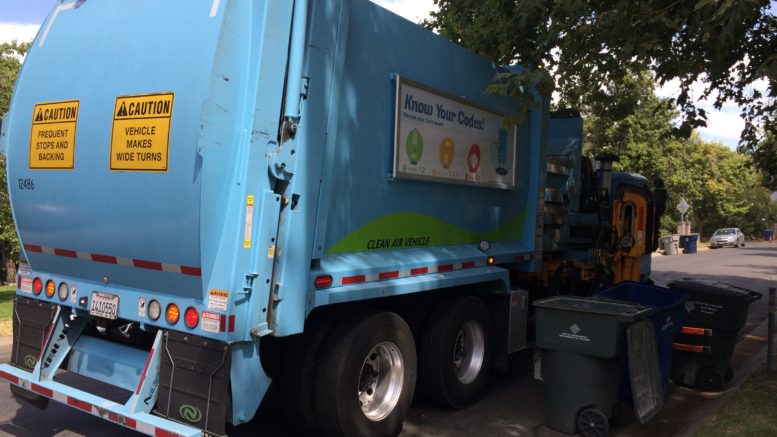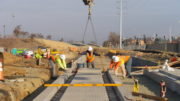If you oppose Sacramento’s trash rate hike, it’s time to make some noise
If Sacramento taxpayers aren’t happy with the proposed garbage rate hike, time is running out to speak up.
The City Council is set to vote on the increase, which amounts to $12.33 a month—or a total of 33%—by July 1, 2022 for a family with a medium-sized garbage can. (Update: the city delayed the proposal until Oct. 22 for discussion and later put off a final vote from Nov. 5 and rescheduled it for Dec. 3).
Following the official public hearing Aug. 28, the Utilities Rate Advisory Committee recommended the rate hike, which covers garbage, recycling and yard waste collection, plus street sweeping.
But the recommendation wasn’t unanimous. The vote was 5-2 after some residents complained that this is only the latest in a series of city rate hikes. As I pointed out in our Aug. 22 issue, if these increases go through, the average bill for basic city services will rise from $115 a month in 2012 to $193 in 2022.
One speaker pointed out that the piling on of rate hikes is happening even though the city in 2013 reduced how often residents receive recycling and curbside yard waste services—so residents are paying more for less.
Other speakers urged that rates should be based more on how often they require garbage pickup, not just on the size of their collection bin. Besides being fairer, they said it would encourage people to produce less trash.
Megan Fidell, one of the two “no” votes along with P. Anthony Thomas, said the 28,000 customers who have the smallest, 32-gallon garbage can—about 20% of households—are subsidizing those with 64-gallon and 96-gallon containers.
At the hearing, city officials reinforced their reasons for the rate hike: increasing labor, disposal and other operating costs; more pickups in a growing city; and new state laws, including one requiring collection of residential food waste. That means a new fee—starting at $8.74 a month—for 11,000 customers who don’t pay for city yard waste service because they get service from homeowner associations or live in condos or townhomes that don’t have yards.
But some residents aren’t convinced. Since my August editor’s note, I’ve received a few emails. One reader said he was outraged by the rate hikes and called this proposal “ridiculous and immoral” because low-income families cannot afford it. He said his bill is $138 a month, even with help from the city’s assistance program, which he called “a joke.”
He said he tried to get a reply from a City Council member to this question: Can residents opt out of city garbage collection?
The short answer: No.
City Code requires residential customers to use the city’s service. So even if you haul your garbage to the landfill, you’ll still get billed.
Despite the concerns over the rate hike, there were a lot of empty seats for the public hearing and only about a dozen residents spoke. And before the meeting, just 124 written protests were sent in from nearly 138,000 notices delivered to residents.
Democracy is not a spectator sport. For it to work, people have to get involved—by voting, by contacting elected officials, by showing up at public meetings.
If there’s no outcry, can you blame council members for going along with the staff and the advisory committee and supporting this rate hike?






Dear Mr. Rhee: I read your article regarding the garbage rate hike. A couple of months before the public hearing, I received a notice about it. When I saw the startling amount of the increases I decided to attend. It was my first experience attending a meeting of any commission or the city council. I listened to the presentation of Mr. Council, the Integrated Waste Management GM, who, in part, justified the proposed rate increases based on the City’s population growth, funding for construction of a compressed natural gas fueling station, conversion of the fleet from Liquefied Natural Gas to Compressed Natural Gas, and increased frequency of street sweeping service. He said that without the proposed increases there is a danger of depletion of the division’s reserve fund. I spoke, pointing out my opinion that the proposed increases seem extraordinary, that increased population should not be a factor because the new residents have to pay the rates so there is increased income, and that perhaps, if the situation is dire, the gas projects should be delayed and street sweeping services can be decreased again. No one replied to my comments or the comments of anyone else who spoke, including those who made a compelling case that they can’t afford rate increases. I was then surprised when the commission proceeded to vote. I admit my past lack of involvement and understanding of how these commissions work, but I was left with the feeling that the public comments procedure is unimportant to the commission and a mere formality to give the appearance of a process that takes into consideration the opinions of members of the public, but really does not. I assumed that after the public meeting there would be further consideration by the commission based, in part, on the public opinions. I think there could have been 300 of us at the meeting and the outcome would have been no different. I agree that lack of citizen involvement is a problem, but perhaps a bigger part of the problem is the failure of local politicians (and I include members of the Utilities Rate Advisory Commission) to understand the burdens imposed on citizens by tax and rate increases, which are multiplying constantly.